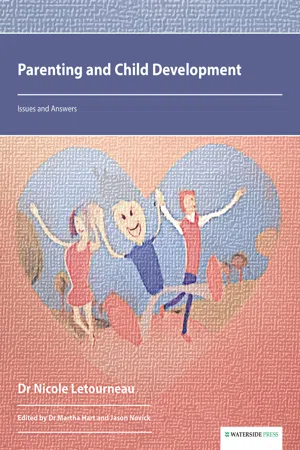
- English
- ePUB (mobile friendly)
- Available on iOS & Android
About this book
In recent years, parenting research has demonstrated that toxic stressors such as intimate partner violence, postpartum depression, and substance abuse significantly diminish the quality of mother-child interaction. Moreover, research has shown that childhood is a sensitive period, during which cumulative exposure to adversities inhibits relationship quality, mother-child interaction and subsequent child health and developmental outcomes. Researchers have focused upon identifying populations at risk and interventions to improve related outcomes.Parenting and Child Development: Issues and Answers encompasses a collection of seminal studies by renowned researcher Dr Nicole Letourneau. The book starts with an examination of the mechanisms by which parent-child interaction and child developmental outcomes are diminished among high-risk families. Promising results of peer support and reflective functioning interventions to promote parent-child interaction and healthy child development are then presented. Finally, the book includes studies that investigate the relationship between genetics, parent-child relationships and child behaviour.
Frequently asked questions
- Essential is ideal for learners and professionals who enjoy exploring a wide range of subjects. Access the Essential Library with 800,000+ trusted titles and best-sellers across business, personal growth, and the humanities. Includes unlimited reading time and Standard Read Aloud voice.
- Complete: Perfect for advanced learners and researchers needing full, unrestricted access. Unlock 1.4M+ books across hundreds of subjects, including academic and specialized titles. The Complete Plan also includes advanced features like Premium Read Aloud and Research Assistant.
Please note we cannot support devices running on iOS 13 and Android 7 or earlier. Learn more about using the app.
Information
Interventions to Promote Parent-Child Interaction and Child Development
Intervention Testing: Primary Studies and Reviews
Improving Adolescent Parent-infant Interactions: A Pilot Study
Table of contents
- Copyright and publication details
- Acknowledgements
- About the author and editors
- Preface
- Section and Chapter Summaries
- Predictors of Parent-Child Interaction and Child Development
- Interventions to Promote Parent-Child Interaction and Child Development
- Epigenetics and New Directions
- Relationships are the Antidote to Toxic Stress
- Index